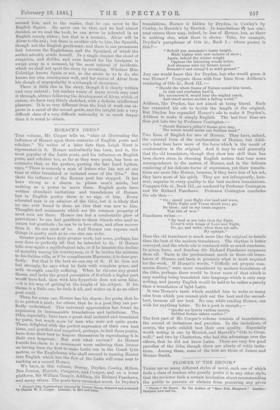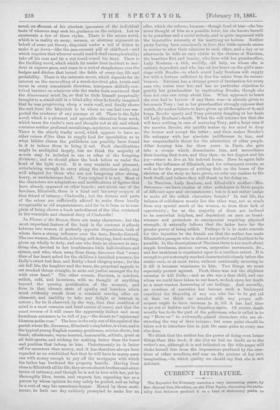FLOWER 0' THE BROOM.* THERE are so many different styles
of novel, each one of which finds a class of readers who greatly prefer it to any other style, that the reviewer feels a certain hesitation about recommending the public to procure or abstain from procuring any given
* Plower o' eto Broom. By the Author of "Rare Pale Margaret." London: Sampson Low and Co.
novel, on ateount of his absolute ignorance of the individual taste of whoever may seek his guidance on the subject. Let us enumerate a few of these styles. There is the severe novel, which is in reality an essay, sermon, or abstruse argument on behalf of some pet theory, disguised under a veil of fiction to make it go down—like the jam-covered pill of childhood—and which requires that whoever would read it shall (metaphorically) take off his coat and tie a wet towel round his head. There is the thrilling novel, which whirls its reader from incident to inci- dent at express pace, and tears in a sort of steeplechase over the hedges and ditches that bound the fields of every-day life and probability. There is the intricate novel, which depends for its interest on the unravelling of a much-involved plot, twists and turns in every conceiyable direction, interposes skilfully-con- trived barriers on whatever side the reader feels convinced that the denouement must lie, so that he finds himself perpetually brought to a stand-still in a blind alley when he fondly imagined that he was progressing along a main road, and finally shows the exit from the labyrinth to be where no one had ever sus- pected the existence of any passage at all. There is the light novel, which is a pleasant and agreeable relaxation from work, which taxes the reader's care and thought not at all, and which contains neither profound moralisings, mysteries, nor sensations. There is the utterly trashy novel, which appears to have no other raison d'Ure than to supply food for speculation as to what hidden charm tha publishers can possibly have found in it to induce them to bring it out. Such classifications might be multiplied largely, but we think the majority of novels may be included in one or other of the foregoing divisions ; and we should place the book before us under the head of the light novel. It is very readable and pleasant, entertaining enough to carry along the attention easily, and well adapted for those who are not hungering after strong, heavy, or unwholesome food. Very original it is not. Most of the characters are adaptations and modifications of figures that have already appeared on other boards ; and about one of the heroines, Elizabeth, there is a faint and far-away soupcon of that friend of infancy—Cinderella ; but the dresses and parts of the actors ore suificiently altered to make them hardly recognisable as old acquaintances, and far be it from us to com- plain of being shown a fresh embodiment of the idea contained in the venerable and classical ;:itory of Cinderella
In Flower o' the Broom, there are many characters ; but the most important feature of the book is the contrast it affords between two women of perfectly opposite dispositions, both of whom have a strong influence over the hero, Brooke Grenvil. The one woman, Elizabeth, is loving, self-denying, hard-working, given up wholly to duty, and one who finds no pleasure in any- thing else, devoted to her troublesome little half-brothers and sisters, and who, when away from them, discovers that "every fibre of her heart ached for the children's banished presence, for Dolly's sweet lost face, and Bobby's fond clinging arms ; for the old full life, the laughter and the tears, the perpetual appeals to set crooked things straight, to mete out justice amongst the fry with even hand." The other woman, Narcissa, is indolent, selfish, cold, and luxurious, with no thought of anything beyond the passing gratification of the moment, and lives in that chronic state of apathy and boredom which must evidently result from a constant craving after ex- citement, and inability to take any delight or interest in nature ; for be it observed, by the way, that that condition of mind is a most common and fatal source of ennui, and that the exact reverse of it will cause the apparently dullest and most humdrum existence to be full of joy,—the desert to " rejoice and blossom as the rose." The hero is the only son of the squire of the parish where Mr. Devereux, Elizabeth's stepfather, is vicar, and is the typical young English country gentleman, not too clever, but frank, affectionate, warm.hearted, honourable, athletic, great at all field-sports, and wishing for nothing better than the home and position that belong to him. Unfortunately he is better off for ancestors than money, and it has therefore always Leon regarded as an established fact that he will have to marry some one with money enough to pay off the mortgages with which his father has burdened the property heavily. Having lived close to Elizabeth all his life, they are on almost brother-and-sister terms of intimacy, and though he is not in love with her, yet he thoroughly likes, trusts, and respects her, regarding her as a person by whose opinion he may -safely be guided, and as being in a sort of way his conecienceleeper. Moved by these sent& meats, he feels one day suddenly prompted to make her an offer, which she refuses, because—though fond of him—she has never thought of him as a possible lover, for she knows herself to be penniless and a social nobody, and is quite impressed with the imperative necessity of his marrying an heiress. Neither party having been consciously in love, this little episode seems in nowise to alter their relations to each other, and a day or so afterwards he falls an easy victim to the charms of Narcissa, the heartless flirt and beauty, who lives with her grandmother, Lady I3onham—a rich, worldly, old lady, on whom she is entirely dependent, and who has set her heart on the girl's mar- riage with Brooke—in which event Lady Bonham will supply her with a fortune sufficient to free his estate from its encum- brances. Nareissa has a strange power of fascination for every man who comes near her, and has no particular objection to gratify her grandmother by captivating Brooke, though she does not care one scrap about him. What approach to heart she ever had to bestow—if any there was—is already given to her cousin Tony ; but as her grandmother strongly opposes that match, she makes believe to have given up all thoughts of it, and keeps Brooke openly and Tony privately dangling at her heels till Lady Bonham's death. When the will informs her that she will have nothing in case of marrying Tony, and a large BUITI if she marries Brooke, she quickly makes up her mind to drop the former and accept the latter ; and then makes Brooke's life unhappy with her absolute indifference to him, and her unquenchable thirst for the admiration of other people. After keeping him for three years in Paris, she gets into a scrape which disenchants him, and necessitates their leaving that town, and they then—to her disgust and his joy—return to live at his beloved home.. Here he again falls under the influence of Elizabeth, and for subsequent events, as well as for the purpose of putting flesh on the bones of the skeleton of the story we have given, we refer our readers to the book itself, and believe they will thank as for doing so.
In Narcissa, Lady Bonham, and Elizabeth's mother—Mrs. Devereux—we have studies of utter selfishness in three people of different ages and circumstances ; but is it not rather unfair to make all the selfish characters female ? In real life, the balance of selfishness mostly lies the other way, not so much from any special merit of the women, as from their lack of opportunity ; for as the majority of them are inclined to he somewhat helpless, and dependent on men as bread- winners and protectors in emergencies requiring physical strength, it naturally follows that the latter have far the greater power of being selfish. Perhaps it is to make amends for this injustice to the female sex that the author has made Elizabeth a paragon who is almost too perfect and faultless to be possible. In the descriptions of Narcissa there is too much about supple loveliness, sinuous curves, serpentine movements, &c., and her snakiness is expatiated upon to a needless extent. It is enough to put a strongly-marked characteristic clearly before the reader once, or at most twice, without continually recurring to it till it becomes wearisome to him. Two things we must. especially protest against. First, there was not the slightest occasion to kill Dolly,—and as she was a dear child, and one whom we could have taken to our heart, we look upon her death as a most wanton harrowing of our feelings. And secondly, an overdose of narcotics has become such a hackneyed expedient for disposing of any one who has to be got rid of, that we think no novelist with any proper self- respect ought to have recourse to it, till it has had time to go out of fashion and be forgotten again. Of course, death usually has to do the part of the policeman, who is called in to say "Move on" to awkwardly-placed characters who are ob- structing the way of their betters ; but some pains should be taken not to introduce him in just the same guise as every one else does.
We think that the author has the power of doing even better 'things than this book, if she (for we feel no doubt as to the writer's sex, although it is not indicated on the title-page) will shake herself free from the impressions produced by the crea- tions of other novelists, and soar on the pinions of her own imagination,—in which quality we should say that she is net deficient.



































 Previous page
Previous page